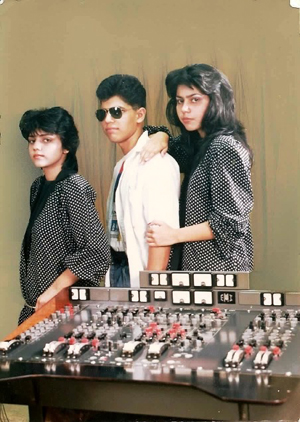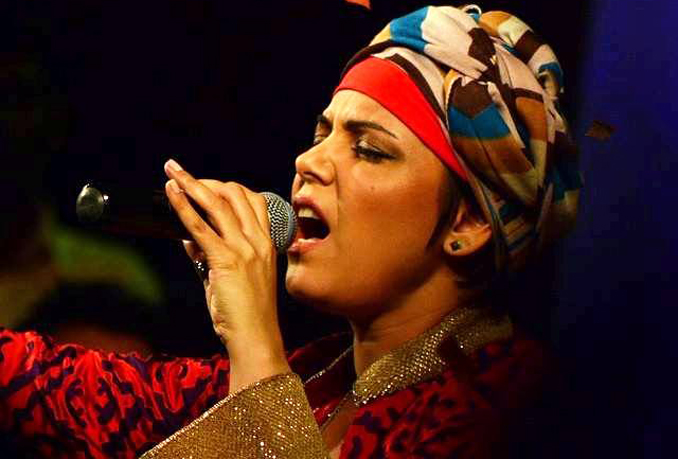Written by: Amna Javed
Posted on: May 05, 2015 | 
Hadiqa with her mother and brother
Born and bred in Rawalpindi, Hadiqa’s mother has had a strong contribution to her career and the consequent success over the last two decades. At the tender age of 3, Hadiqa’s father passed away and it was all up to her mother Khawar, to provide for her three children. Khawar, principal of a local government school, enrolled them at the Pakistan National Council of Arts (PNCA) Children Art Workshop, where Mr. Asad Qazilbash then unearthed the glorious talent that the young Hadiqa possessed. Proving her mettle ever since she was a child, Hadiqa managed to dominate the music arena of Pakistan even before it existed as such.

When asked about the current state of the Pakistani music industry and its prospects, she poured her heart out. “We’re not taking our art and culture seriously, which is the true face of this country.” Recalling her childhood, she mentioned how PNCA acted as a patron for all activities relating to art and culture and provided a solid platform for children to explore the artist within them. Even though it was General Zia-ul-Haq’s regime, when art and culture suffered severely, PNCA managed to produce stars like Hadiqa, Ustaad Raees Khan and Ustaad Nafees Khan. PNCA took the responsibility of developing their talents and sponsored their trips to countries such as Greece, Jordan and Turkey where they had an opportunity to socialize with the locals and learn about their culture. “The security and comfort that PNCA provided back in the days was the reason that parents like mine made an extra effort to have their children enrolled at the Children Art Workshop. That security and confidence, along with similar initiatives in institutions is missing these days.”
After her recent performance at the Music Mela in Islamabad, Hadiqa was very optimistic about the revival of the Pakistan Music Industry. Having seen the days where it was the most dynamic industry, she feels that in the wake of recent developments (relating to terrorism and extremism) music industry has been plunged into darkness. “You’d be surprised to know that there is only one Sitar maker left in Pakistan now,” she decried, adding that the industry is deprived of the attention that it deserves. The makers of traditional musical instruments have disappeared entirely from the markets and the skill is not being passed on to future generations because there is no earning from this field.
Kiani elaborated how art and culture in general took a hit during the last ten years, but it is music that has been thrown into the darkest pit. The television and film industry are being revived and are witnessing mushrooming growth; however, music industry is still in shambles. “Our children are disconnected with their culture; they need to be familiarized with their roots,” she said with great enthusiasm. “While judging the Pakistan Idol, I witnessed remarkably talented youngsters who were bubbling with passion and determination, but there are hardly any platforms for them.” Delving further into the root of the problem she cited the absence of record labels as an important factor for the poor state of music and musicians in the country. She explained how artists are reluctant to choose music as their primary field because it requires them to produce their albums themselves and there are no institutions that offer support in that regard. Besides that, local music channels do exist, but they have started airing content from across the border as it attracts more viewers. Therefore, the avenues for local artists are extremely limited. Due to the deteriorating security situation, concerts and musical evenings rarely take place, and one is left wondering where to showcase their talent.
Hadiqa then went on to describe the difficulties that her brother (Irfan Kiani) went through to find old Pakistani music instruments for her upcoming music album. When asked about her brother’s role in her life, Hadiqa referred to him as her “pillar” and “support system”. “At the back end, it is Irfan who manages everything for me.”
Hadiqa reiterated that traditional musical instruments must be preserved for the generations to come and the best way to rejuvenate interest in them is to integrate them with modern-day music. Known for her experimentation and variations in genres and style, Hadiqa is now venturing into Qawwali. Her new album would feature traditional Pakistani instruments, such as the sitar, sarod and dambur (used by Akhatr Chinar). “My brother has a great role in digging up these lost instruments,” she explained.

Stars such as Hadiqa can play a vital role in instilling a sense of social responsibility in our society and can also promote humanitarian causes on a grand scale. An inspiration for many, the music diva effectively splits her time between her family, commitment to music and extensive humanitarian work.
You may also like: